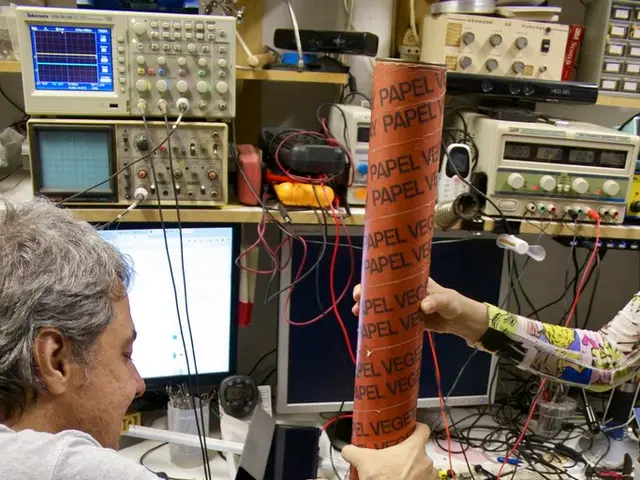Bayer secures a monetary agreement surpassing the billion mark
In a significant move, Bayer, a leading DAX-listed company, has entered into a global exclusive licensing and collaboration agreement with Kumquat Biosciences. The focus of this partnership is to develop and commercialize Kumquat's KRAS G12D inhibitor, a promising precision oncology drug targeting a prevalent oncogenic KRAS variant found in pancreatic, colorectal, and lung cancers [1][2][3][4][5].
Under the terms of the agreement, Kumquat is responsible for initiating and completing the Phase Ia clinical trial for the KRAS G12D inhibitor. Bayer will then take over subsequent development, regulatory, and commercial activities. The financial structure of the partnership includes up to $1.3 billion in total payments to Kumquat, consisting of upfront fees, clinical and commercial milestones, and tiered royalties on net sales [1][4].
Kumquat, a biotech company specialising in the KRAS signalling pathway, which is present in nearly 25% of all human cancers, has developed an inhibitor for the KRAS G12D mutation, the most prevalent oncogenic KRAS variant without effective targeted treatments [3][4]. This mutation is particularly common in pancreatic ductal adenocarcinoma (PDAC), colorectal cancer, and non-small cell lung cancer, with PDAC being particularly hard to treat and associated with low survival rates [3][4].
This partnership aims to address a significant unmet medical need, given the high prevalence of KRAS mutations in cancer and the lack of effective treatments for the KRAS G12D variant. The collaboration strengthens Bayer’s early precision oncology pipeline by potentially adding a novel small-molecule treatment option for these lethal cancers. Kumquat, founded by pioneers in KRAS biology, brings deep expertise in this pathway, enhancing the prospects for developing an effective KRAS G12D-targeted therapy [1][4].
It is worth noting that the KRAS inhibitors Krazati by Bristol Myers Squibb and Lumakras/Lumykras by Amgen have recently been approved. However, the KRAS G12D variant, with the highest oncogenic activity, remains a challenging target. The agreement between Bayer and Kumquat Biosciences includes Kumquat initiating and concluding the Phase-1a study, setting the stage for further development and potential approval of the KRAS G12D inhibitor.
Investors are expected to stay on the sidelines regarding Bayer, as the impact of this collaboration on the company's numbers might not be immediate. However, this partnership positions Bayer in the high-interest market for KRAS inhibitors, with the potential to transform precision oncology treatment options for major cancers marked by this mutation [1][2][3][4][5].
[1] Bayer and Kumquat Biosciences Announce Global Exclusive License and Collaboration Agreement to Develop and Commercialize Kumquat’s KRAS G12D Inhibitor. Bayer. (2025, July 1). Retrieved from https://www.bayer.com/en/newsroom/press-releases/bayer-and-kumquat-biosciences-announce-global-exclusive-license-and-collaboration-agreement-to-develop-and-commercialize-kumquat-s-kras-g12d-inhibitor
[2] Kumquat Biosciences and Bayer Announce Strategic Collaboration to Develop Novel KRAS G12D Inhibitor. GlobeNewswire. (2025, July 1). Retrieved from https://www.globenewswire.com/news-release/2025/07/01/2438014/0/en/Kumquat-Biosciences-and-Bayer-Announce-Strategic-Collaboration-to-Develop-Novel-KRAS-G12D-Inhibitor.html
[3] KRAS G12D Mutation: A Major Player in Cancer. National Cancer Institute. Retrieved from https://www.cancer.gov/about-cancer/causes-prevention/genetics/kras-g12d-mutation
[4] Kumquat Biosciences. (2025, July 1). Retrieved from https://www.kumquatbiosciences.com/
[5] Bayer. (2025, July 1). Retrieved from https://www.bayer.com/en/home.aspx
Technology plays a key role in this partnership, as Kumquat, a biotech company specializing in the KRAS signaling pathway, has developed an inhibitor for the KRAS G12D mutation using advanced technology. The finance aspect of the collaboration includes up to $1.3 billion in total payments to Kumquat, demonstrating the significant value placed on technology in the finance sector for developing promising precision oncology drugs.




